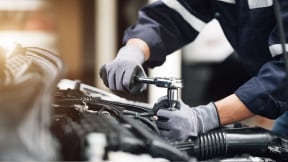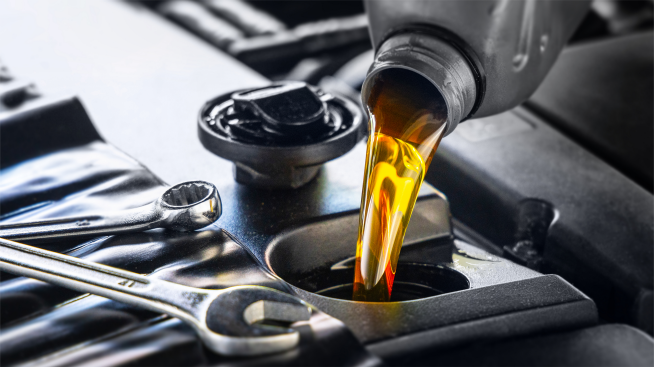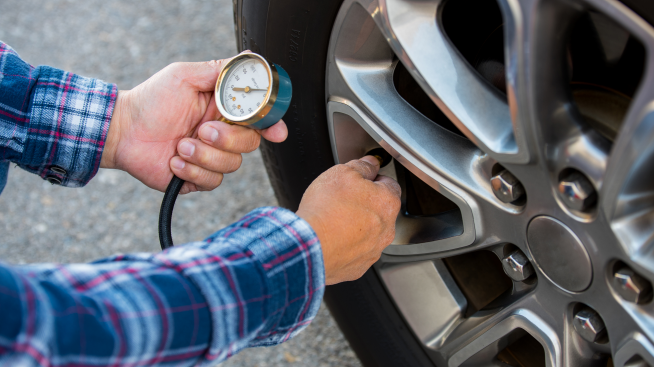A guide to the different types of gas at the pump

When you pull up to most gas stations these days, you’re likely to see at least three different types of gas at the pump. Are the more expensive options better for your car? Are the cheaper ones worse? In reality, it’s not quite that simple. Let’s learn a little more about the various types of gas you can expect to find at the pump.
The three types of gas
Unless your car drives on alternative fuel (more on these later), you’ll typically see three types of gas at your local gas station. They're distinguished by their octane rating, which serves as a measure of a fuel’s stability. The higher the octane rating, the greater the pressure the fuel can withstand. The three types of gas are:
Regular
Regular gas has the lowest octane rating, typically coming in at 87. This is the standard fuel for most cars.
Mid-grade
Sometimes referred to as “plus” or “special,” mid-grade tends to be somewhere in the 89 to 90 octane range.
Premium
Premium gasoline, sometimes called “ultra” or “super,” usually features an octane rating of 91 to 94. Premium gas is intended for high-performance cars.
There are some varieties of gasoline that feature additives to boost engine life. This is a specific fuel designation that's unrelated to the octane ratings used to designate gas as “premium.”
Leaded vs. unleaded
You may have seen the term “unleaded” gasoline in some places, and possibly wondered if there's a leaded counterpart. The short answer is yes, but it’s no longer available for regular use.
In the past, leaded gasoline was the primary gas sold at fuel pumps nationwide. It featured an additive known as tetraethyl lead (TEL), which boosted octane ratings and lowered wear on certain engine parts. However, TEL was eventually linked to health and environmental issues, and leaded gasoline has since been phased out.
Other common gas types
Many gas stations offer alternatives to gasoline. Some of the most common alternative fuels you’re likely to see are:
Diesel
Diesel fuel is strictly for use in vehicles that have diesel engines. Diesel engines are structured differently than standard gas engines and are often used in heavy-duty vehicles.
Flex-fuel
Flex-fuel is an ethanol-based fuel featuring a mixture of 85% plant-based ethanol and 15% gasoline, sometimes referred to as “E85.” Ethanol comes from renewable resources like corn.
How to find out which type of fuel your car needs
When trying to figure out which type of fuel to use for your car, it’s generally important to follow the manufacturer’s recommendations. This information is typically found in the owner’s manual, and you may be able to find it via the manufacturer’s website. Cars that require premium fuel often feature additional indications near the fuel cap or by the fuel gauge in your dashboard.
What happens if you fill up with the wrong fuel?
Manufacturers typically specify what kind of fuel your car needs for a reason. Putting the wrong kind of fuel in your car could even lead to an expensive trip to the repair shop. Here’s an overview of some of the most common scenarios to watch out for:
Premium gas in a regular engine
It’s tempting to think that using premium gas is like eating a healthier diet. Unfortunately, it doesn't quite work like that for cars. Premium gasoline won’t produce any performance benefits in a regular engine — it'll just cost you more to fill up.
Regular gas in a high-octane engine
Cars that ask for high-octane fuels have engines that were designed for that fuel. While these engines will technically still run on a lower-octane gas, the decreased fuel quality may cause engine knocking and loss of performance, and damage the engine over time.
Can you mix gas types?
Putting different kinds of fuel into a standard gas engine may have serious consequences. Ethanol, diesel and gas engines differ in design, and using the wrong fuel type or mixing different fuels could lead to an engine shutdown. The car would then require a technician to evacuate the entire fuel system to remove any traces of the offending fuel.
In summary
As you can see, the different types of gas found at the pump are meant for different purposes. Putting the wrong types of gas in your car might lead to a hefty repair bill, so be sure to follow the manufacturer’s recommendation.



